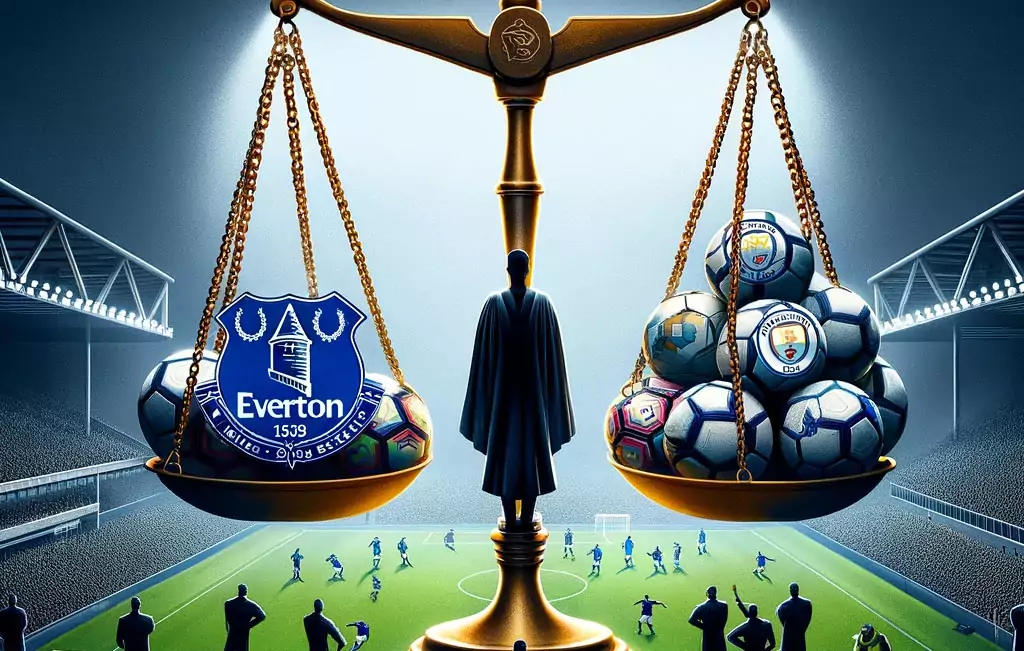Everton were handed a partial reprieve when their punishment, a 10-point deduction for breaking the Premier League’s profit and sustainability rules (PSR), was reduced to six points.
At last some clarity and relief for the Toffees after months of anxiety and uncertainty while waiting to discover the outcome of their appeal against a sanction many felt was excessive, the severest in the history of the Premier League.
A four-point restoration is a massive boon for Sean Dyche’s side in their bid to preserve their top flight status.
However, there is still the small matter of additional charges for PSR breaches during the 2022-23 season which could result in another points deduction.
Fellow Premier League strugglers Nottingham Forrest face similar charges for breaches during the same period.
The two cases and potential appeals must he heard and finalised before the end of the season.
Conception versus execution
Clubs must live within their means, sustained by the resources they generate. The rationale for this is unimpeachable.
The shame is that a system paved with such noble intentions is being undermined by erratic implementation, some say selective application of rules.
There is something tragically ironic about the growing perception that a system designed to promote fairness is fraught with bias.
The enforcers of FFP rules stand accused of the most cardinal of sins in the administration of justice; double standards.
One rule for, and another
All clubs must be equal before FFP regulations.
The integrity of the FFP system and its Premier League derivative, Profit and Sustainability Rules (PSR), is brought into serious question when authorities appear to dither when dealing with some cases only to act with swift decisiveness when dealing with others.
It’s a damning indictment of the system when a club that has had more than 100 FFP charges hanging over its head for a couple of years is yet to face ‘prosecution’.
There is growing cynicism about authorities’ seeming reluctance to punish Manchester City, who have been charged with a reported 115 breaches spanning several seasons.
In light of this appearance of lack of appetite to punish Man City, the fact that they have accepted their own charges notwithstanding, Everton’s deep sense of victimization seems justified.
In fact, there is widespread sympathy for Everton, with many seeing them as classic soft targets.
The Everton precedent
What’s good for the goose is good for the gander.
By handing Everton the initial hefty 10-point penalty authorities sought to make an example of an offender and to prove that breaches have consequences.
But by so doing has the Premier League made a rod for its own back?
In the simplicity and crudeness of the layman’s eye, the sheer volume of charges against Manchester City means the club must attract a stiffer penalty than that handed to Everton. In the court of public opinion Man City are as guilty as sin.
Yet the administration of justice is based on facts, each case treated on its own merits, and not the need to placate public opinion.
We therefore cannot rule out the possibility that Man City might escape serious censure. They have an army of legal eagles poring over the relevant documents preparing to put forth a robust defence.
Justice delayed
Everton’s failure to play by the rules prejudiced rivals during the three-year period to the 2021-22 season. What sort of ripple effect will the guilty verdict and accompanying punishment have?
Which clubs were prejudiced and how do they seek redress? In the event clubs decide to lodge lawsuits against Everton, how is the amount of compensation to be calculated?
There is a lot of speculation about the range of sanctions Man City could face if found guilty. These include demotion from the Premier League, points deduction, or even being stripped of the silverware they won during the period under review.
The sooner Man City’s case is resolved the better for the integrity of the FFP system.
Justice delayed is justice denied, for Man City and the rivals prejudiced by their actions.
What is Financial Fair Play (FFP)?
Financial Fair Play (FFP), a cornerstone of UEFA’s regulatory framework introduced in 2011, is designed to ensure that football clubs across Europe adhere to a model of economic sustainability. At its core, FFP mandates that clubs cannot outspend what they earn, setting the stage for a financial playing field that is both fair and competitive.
The essence of FFP is threefold:
- Sustainable Club Operations: FFP champions the principle of living within one’s means. It discourages clubs from depending on the deep pockets of affluent owners for injecting unsustainable financial boosts. This approach nudges clubs towards financial autonomy, leaning on their generated revenues for expenditures.
- Equity in Competition: By curtailing the ability of clubs to spend indiscriminately, FFP ensures that the competitive balance isn’t skewed by financial might. This framework ensures that clubs compete on the merit of their financial management and revenue-generating efforts rather than the financial largesse of their benefactors.
- Securing the Future of Football: The long-term health of European football is a paramount concern under FFP. By enforcing fiscal discipline, the regulations aim to forestall the buildup of perilous debt levels that could imperil clubs’ existences and disrupt the sport’s ecosystem.
For clubs gracing UEFA’s marque competitions, such as the Champions League and Europa League, adherence to a “break-even” rule over a rolling three-year period is compulsory. This rule is a litmus test for financial prudence, demanding that clubs’ expenditures do not surpass their earned revenues. Compliance is monitored through meticulous annual financial report assessments by UEFA, ensuring clubs toe the line.
Non-compliance with FFP regulations can invoke a spectrum of penalties, from fines and warnings to more drastic measures like transfer bans, prize money retention, and the dire prospect of being barred from European competitions.
Beyond the UEFA ambit, FFP’s ethos has been mirrored in domestic leagues, including the Premier League’s Profit and Sustainability Rules. This domestic iteration underscores the universal push for financial integrity and sustainability within the football realm, aiming to preserve the sport’s integrity and competitive spirit for generations to come.






